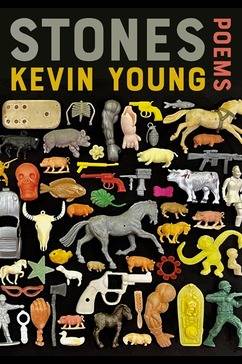The LA Times calls Stones a “book of loss, looking back, and what binds us to life, by a towering poetic talent.”

“We sleep long, / if not sound," Kevin Young writes early on in this exquisite gathering of poems, "Till the end / we sing / into the wind." In scenes that circle generations of family in the American South, the speaker and his young son wander among the stones of their ancestors. "Like heat he seeks them, / my son, thirsting / to learn those / he don't know / are his dead."
Whether it's the fireflies of a Louisiana summer caught in a mason jar (doomed by their collection), or the speaker’s grandmother, Mama Annie, who latches the screen door when someone steps out for just a moment, all that makes up our flickering precarious joy, all that we want to protect, is lifted into the light in Stones. It becomes an ode to Young's home places and his dear departed, and to what of them—of us—poetry can save.
Stones reminds us of poetry’s most enduring power: It takes our strongest emotions and turns them into songs.
Kevin Young is one of the brightest stars in the literary firmament. Born in Lincoln, Nebraska, he’s the author of 15 books of poetry and prose, including Stones, Brown, Bunk, Book of Hours, Blue Laws, The Grey Album, Dear Darkness, For the Confederate Dead, Jelly Roll, and Most Way Home. His work has won the Lenore Marshall Prize from the Academy of American Poets and the Graywolf Press Nonfiction Prize. Mr. Young is director of the Smithsonian’s National Museum of African American History and Culture, and he is also the poetry editor of The New Yorker.
Describing Kevin Young’s newest work, fellow poet Peter Balakian says, “It’s a poem that traces an obsession with confronting the departed whom he wants to remember, and love, and pass on to his son.”
Play podcast in Chrome or Firefox for best viewing experience.
Join us
Kevin Young will be at Colgate on Thursday, Sept. 28, at 4:30 p.m. EDT. Join us physically in the Persson Hall auditorium or register to join us virtually via Zoom. The in-person audience will be able to participate in a post-reading Q&A and book-signing. Everyone is welcome. Admission is free.
Want to hear what thoughtful readers have to say about Stones? Join Colgate faculty and students on Monday, Oct. 2, from 7-8 p.m. EDT for a conversation about all three September Living Writers books. (No preparation is necessary; there’s no need to have read all the books in order to participate.) Register here.
Go beyond the book
- “His work can be quirky and brainy, but it’s never alienating (he has a poem that’s literally about sweet potato pie),” writes David Orr, in this New York Times review of Stones.
- “I felt a lot of ripples in the book, and I really wanted to capture that both in the language, the music of the lines, but also in the imagery,” says Kevin Young in this NPR interview.
- “I Am Trying to Break Your Heart” is one of Kevin Young’s best-known poems.
“The dirt will try
to forget.
The stones hope
to remember.”Stones